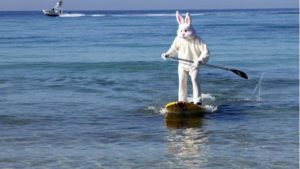Some Easter traditions involve water, not eggs
April 10, 2017Over the weekend, we found an interesting article about Easter and its connection to (you guessed it!) water, which led us to even more Easter traditions involving water.

According to a 2010 Bangor Daily News story, some Fort Kent, Maine, residents, get up before dawn to collect “l’eau de Paques,” or “Easter water.” The article states that it’s a Catholic tradition brought over from France, and is based on “the purity, healing and restorative powers of any water collected from any moving brook, stream or river in the hours leading up to sunrise on Easter.”
The story cites the director of the Acadian Archives at the University of Maine at Fort Kent, who says “Because of Jesus’ Resurrection, this is considered to be holy water with the power to cure.” The water is then stored and brought out to cure or ward off any number of ailments.
There’s also a German tradition, which we found on the blog “A German Girl in America,” about Osterwasser that’s similar: “In some parts of Pomerania, Germany,” the blog reads, “it was customary for a young un-married girl to go to the local stream and gather water on Easter morning. She must not talk to any one on the way there or the way back.”
Like the French tradition, Osterwasser had to be collected before sunrise. The collected water was “supposed to bestow beauty and virtue … If a girl was able to sprinkle her lover with Easter water, there would be a wedding soon.”
The water was also used to protect against “skin and eye ailments … One had to scoop the water from a pure, flowing brook in the earliest Easter Sunday hours before sunrise … Whoever washed himself on Easter Day with such water remained protected from skin and eye ailments.” It was also given to farm animals to keep them healthy.
In Slovakia, says the tourism website Welcome To Bratislava, there’s a tradition in which young single men visit the homes of young single women on Easter Monday and douse them with water — sometimes by the bucketful. It’s “believed to bring health and beauty to the females” — and in return, the men are rewarded with “painted eggs, sweets, money and are invited to dine with the girl’s family.”
There’s a similar Polish tradition, according to Woman’s Day. It’s called Smingus-Dyngus, and also takes place on Easter Monday. “Boys try to drench other people with buckets of water, squirt guns or anything they can get their hands on. Legend says girls who get soaked will marry within the year.”
The many different ways that water is associated with holiday traditions around the world underscores the universal importance water plays in our lives. All things considered, though, it’s probably safer to stick with hiding the Easter eggs than the last two ideas — dousing someone with a bucket of water is a sure way to ensure the Easter Bunny skips your house next year!